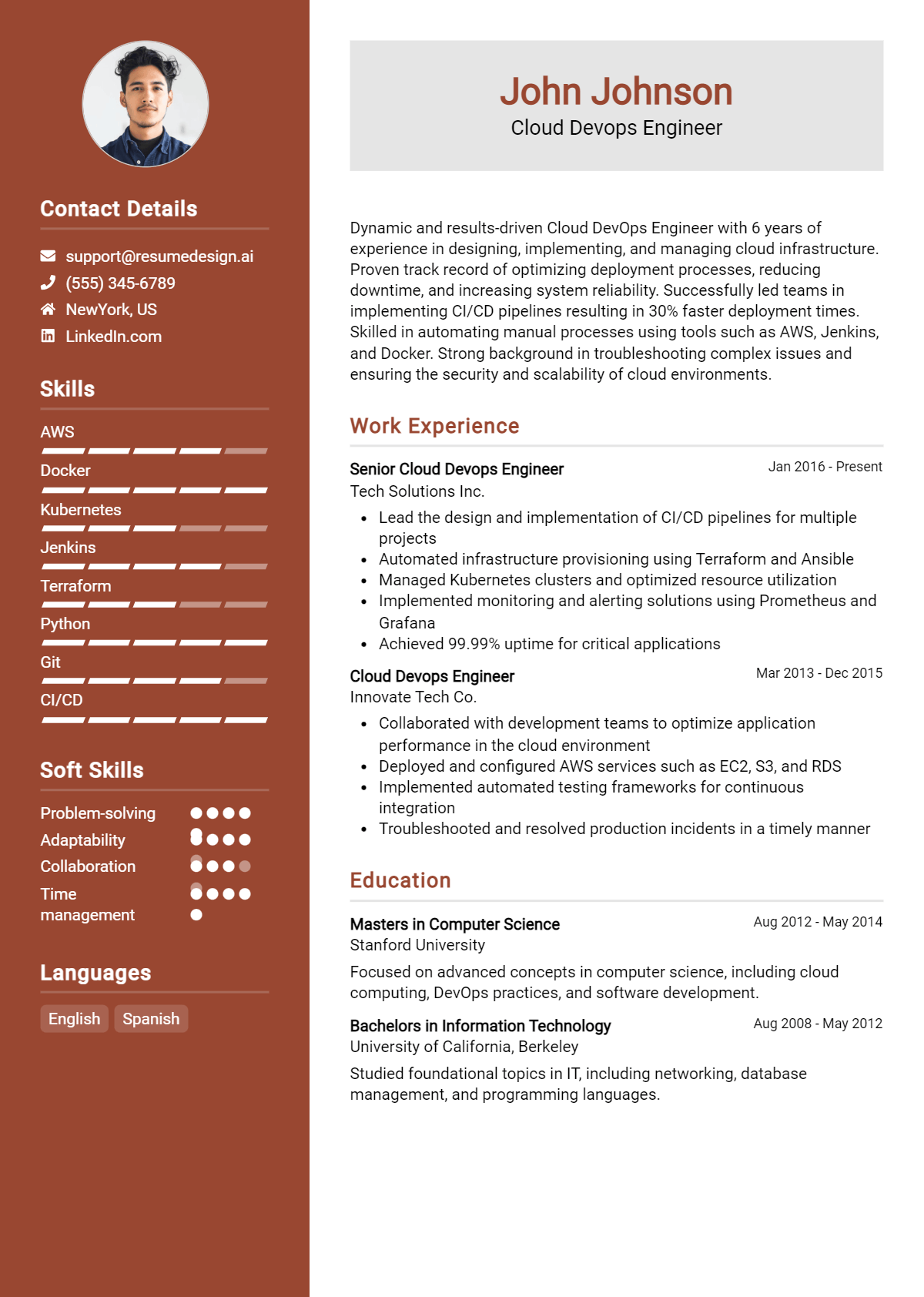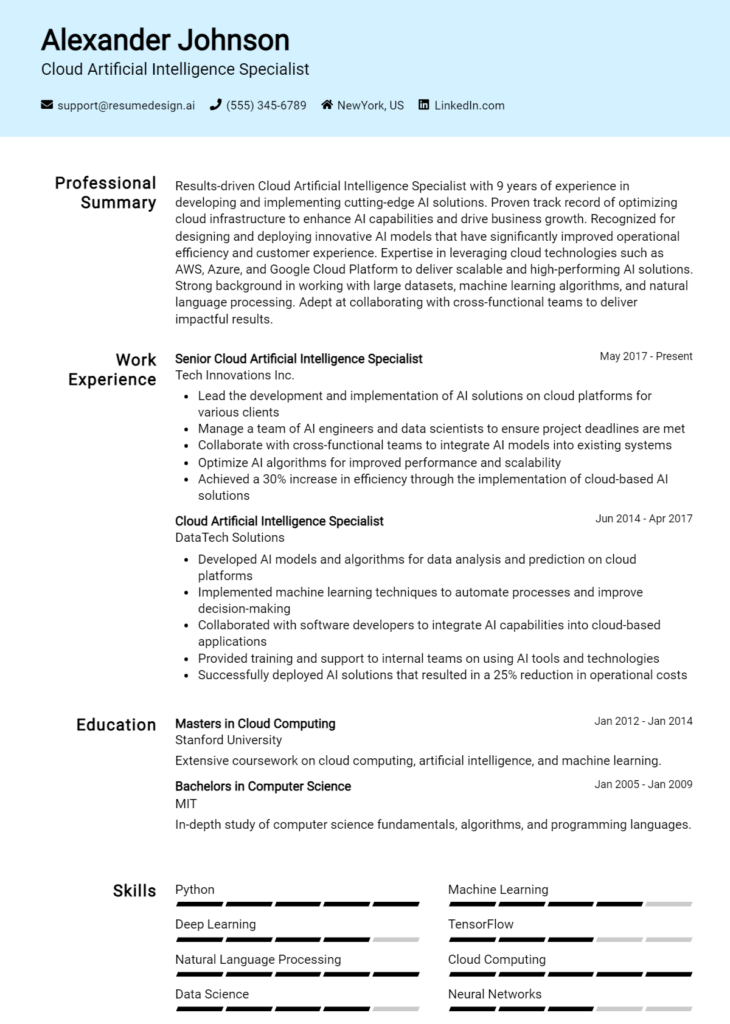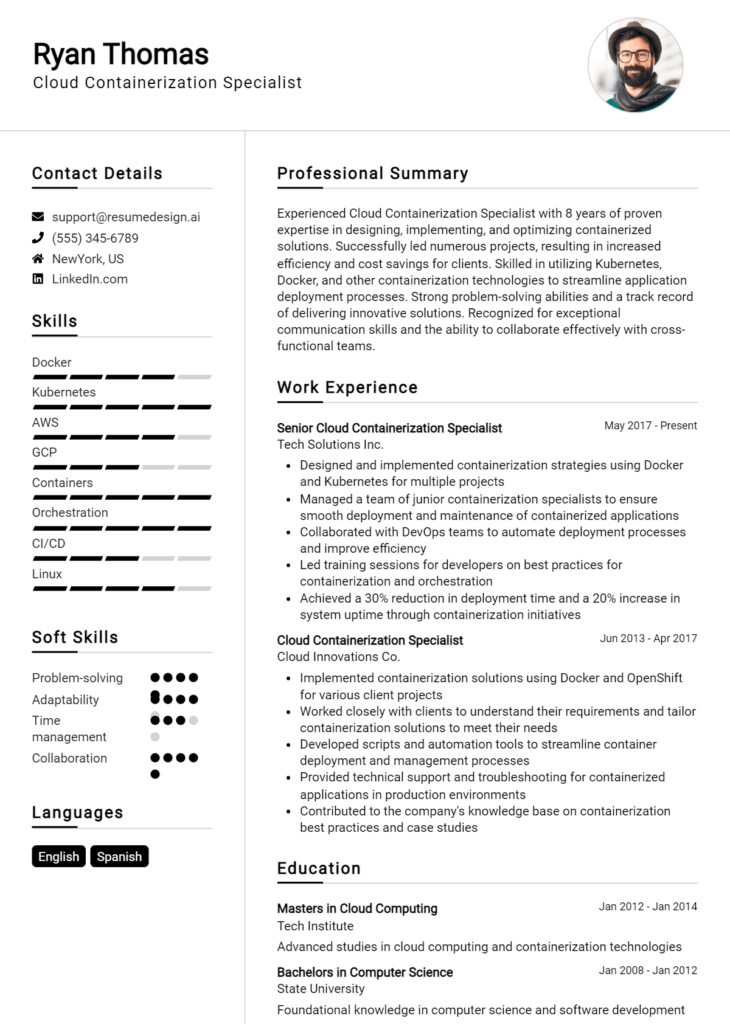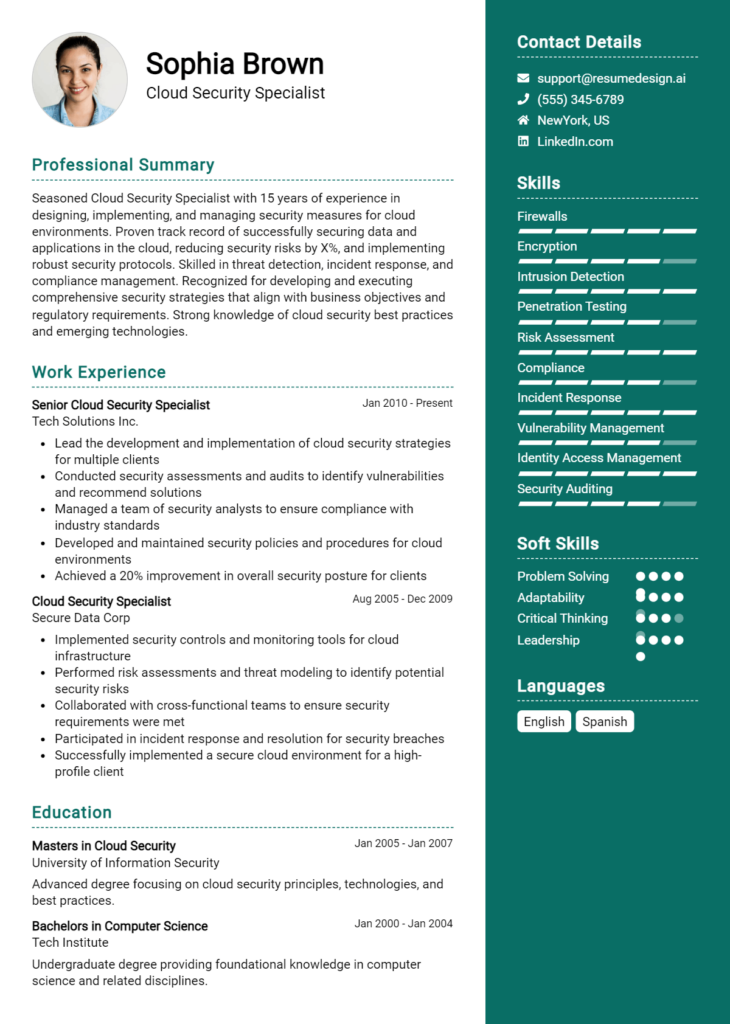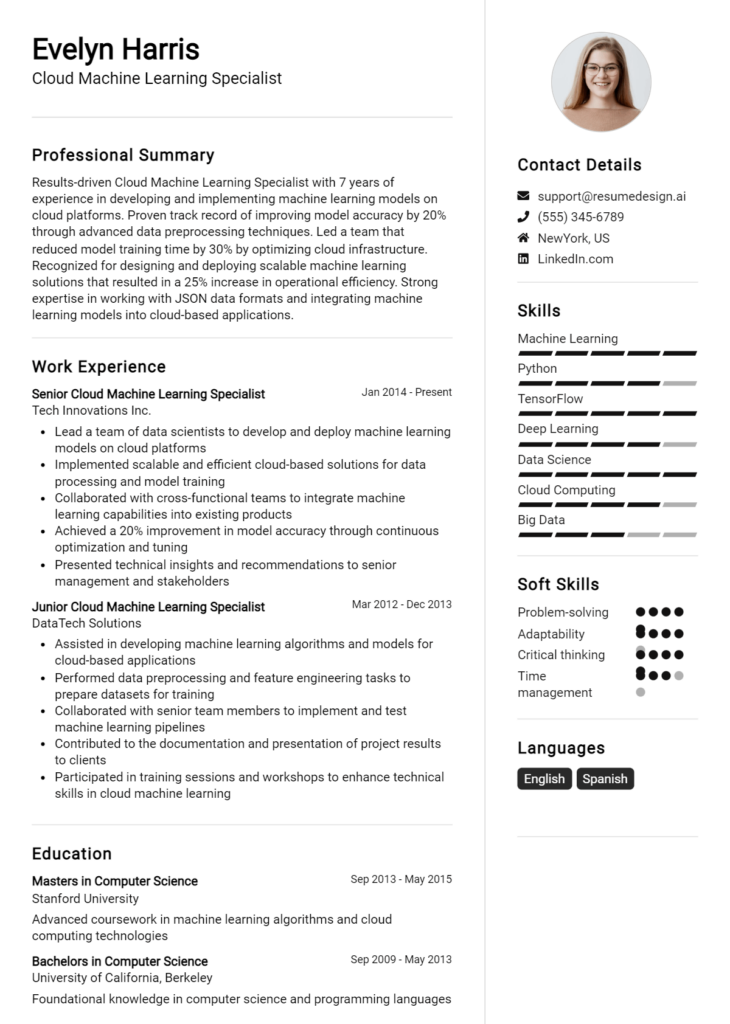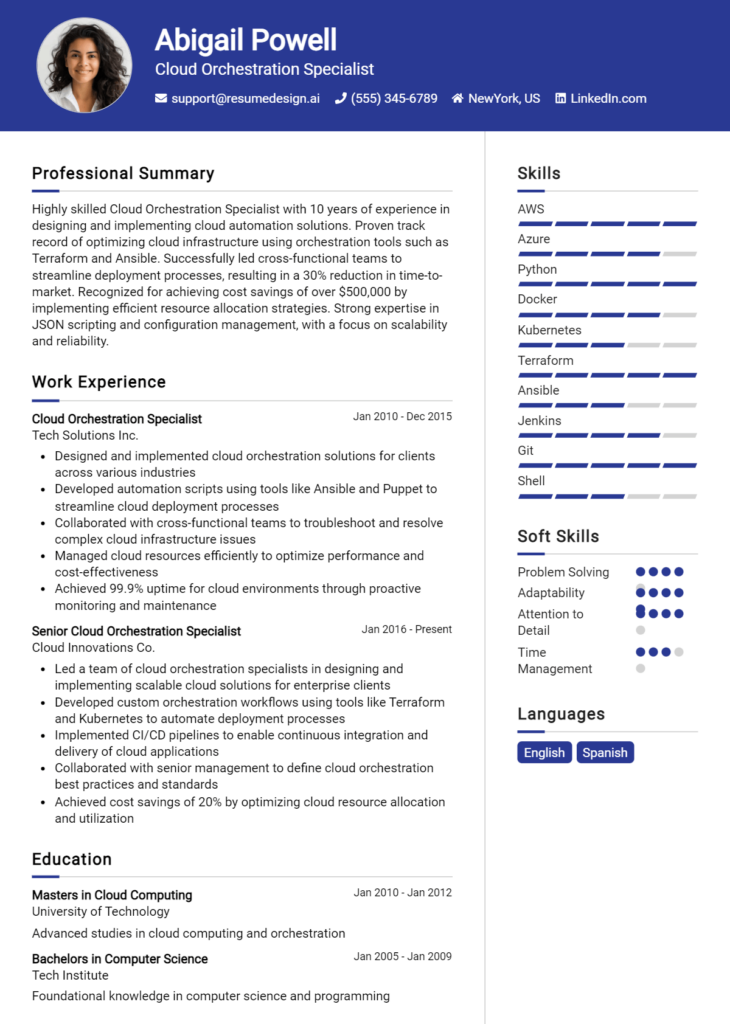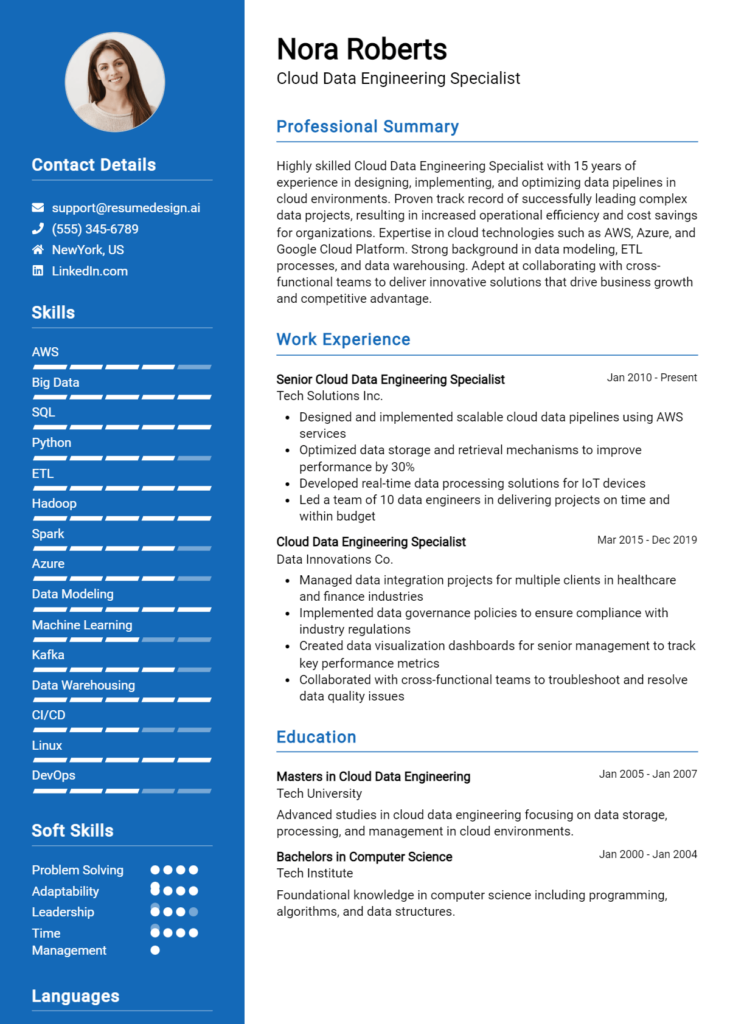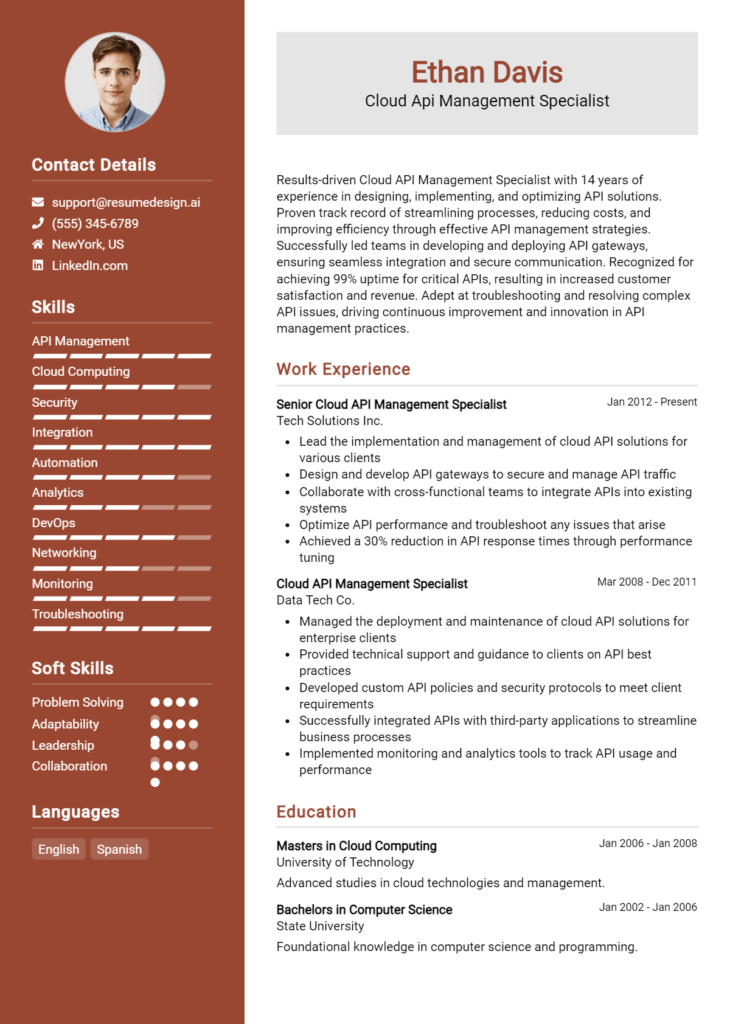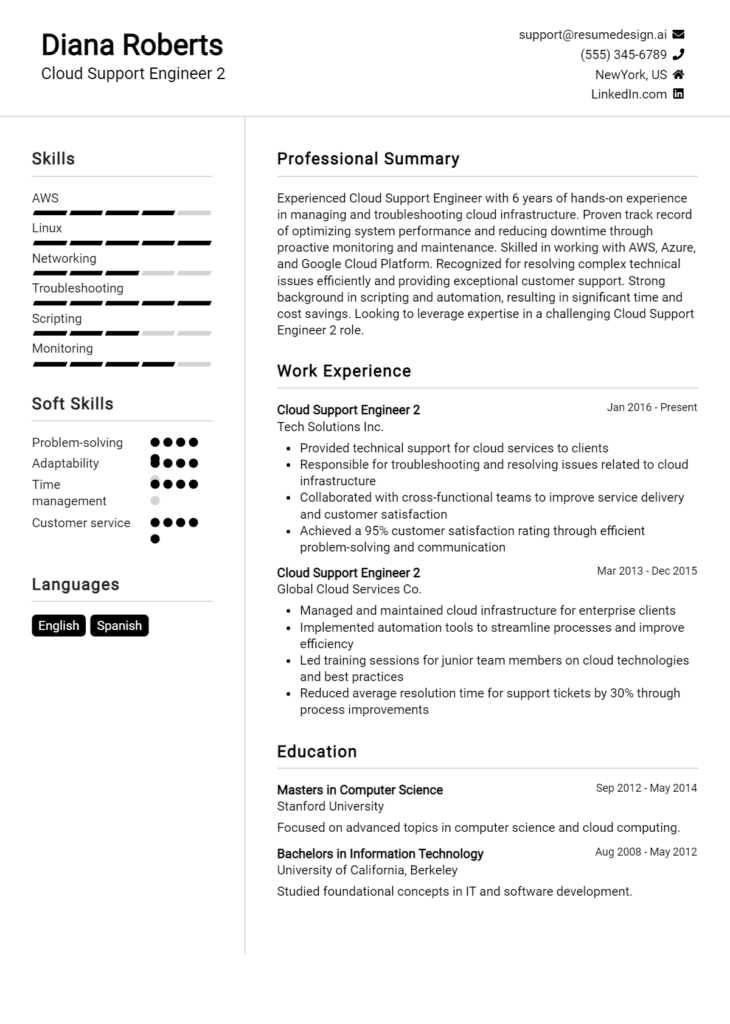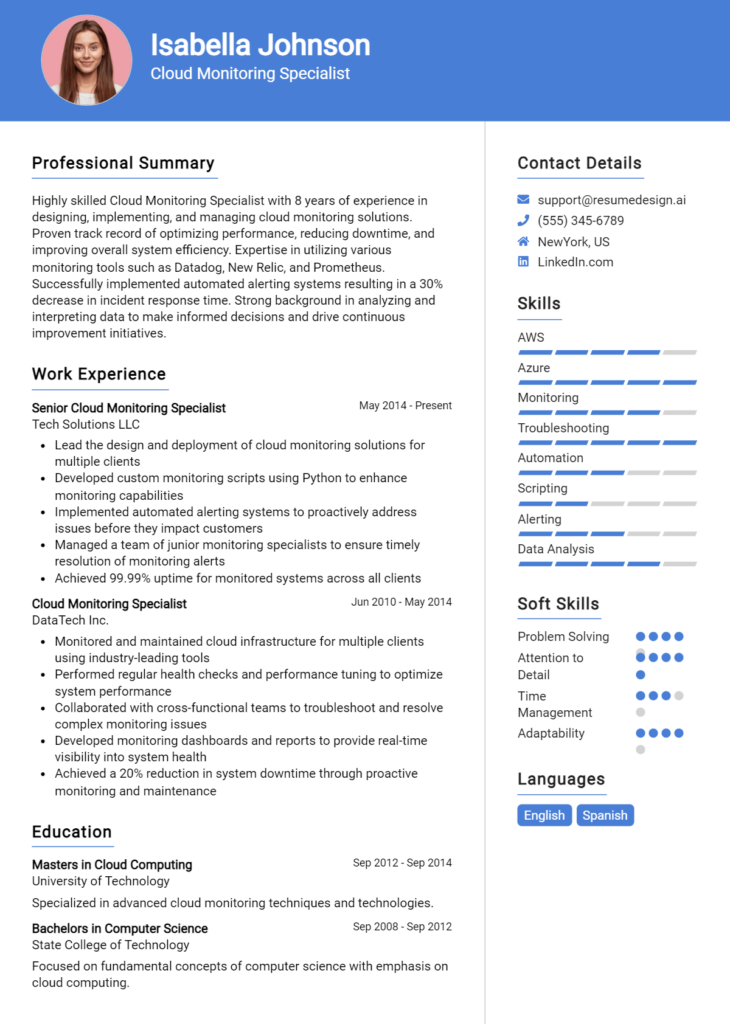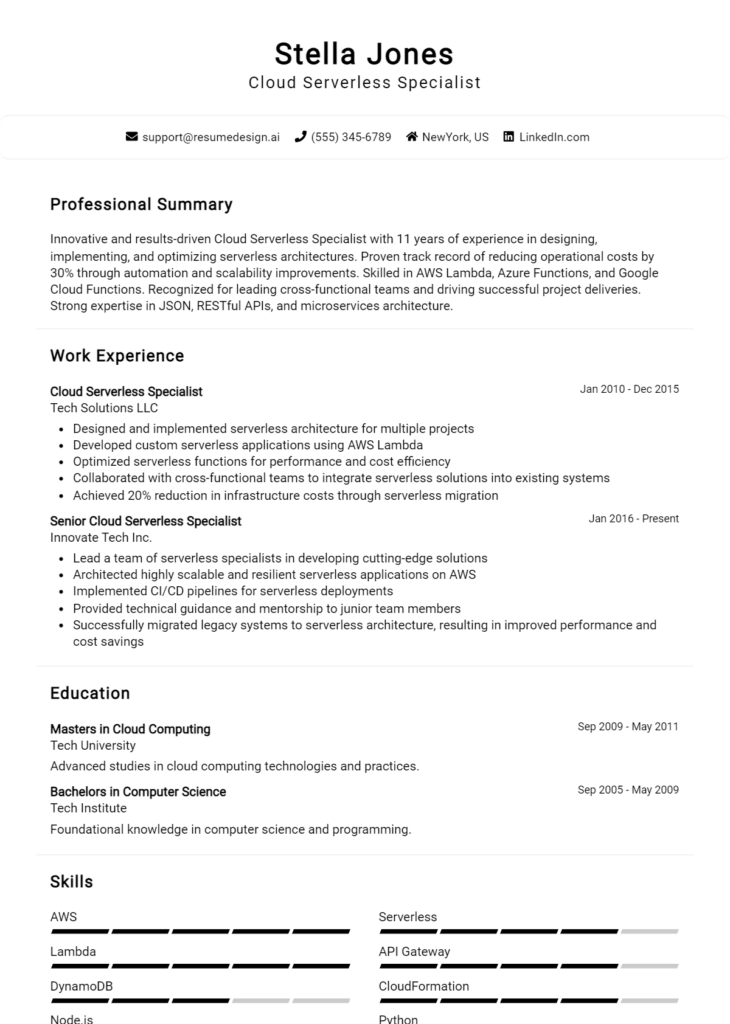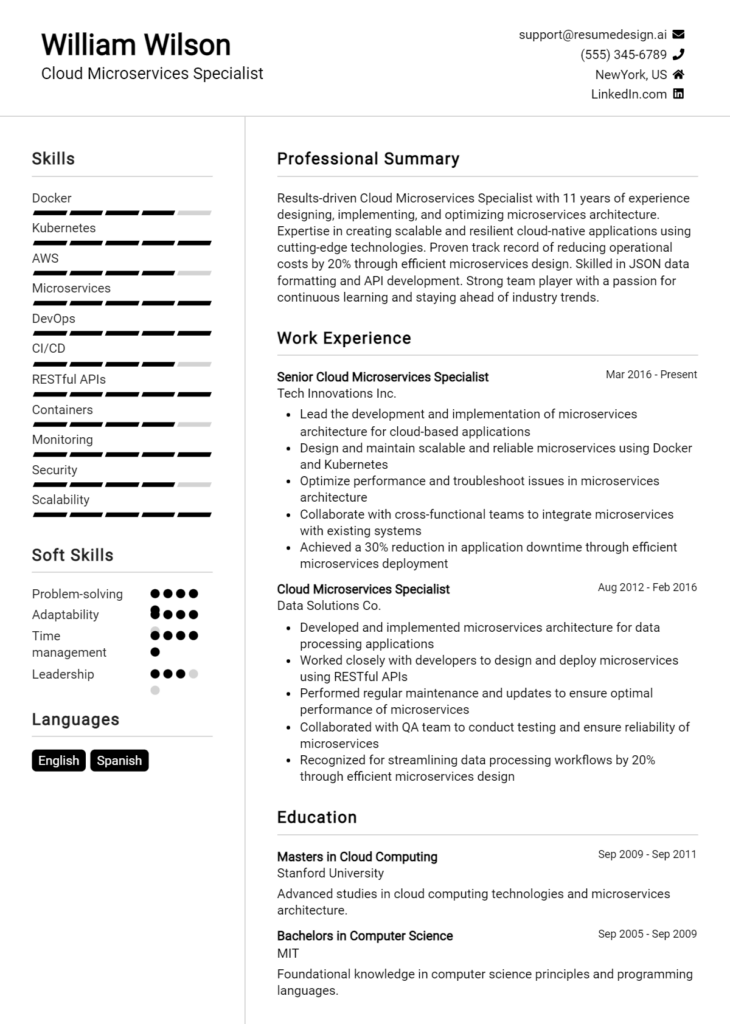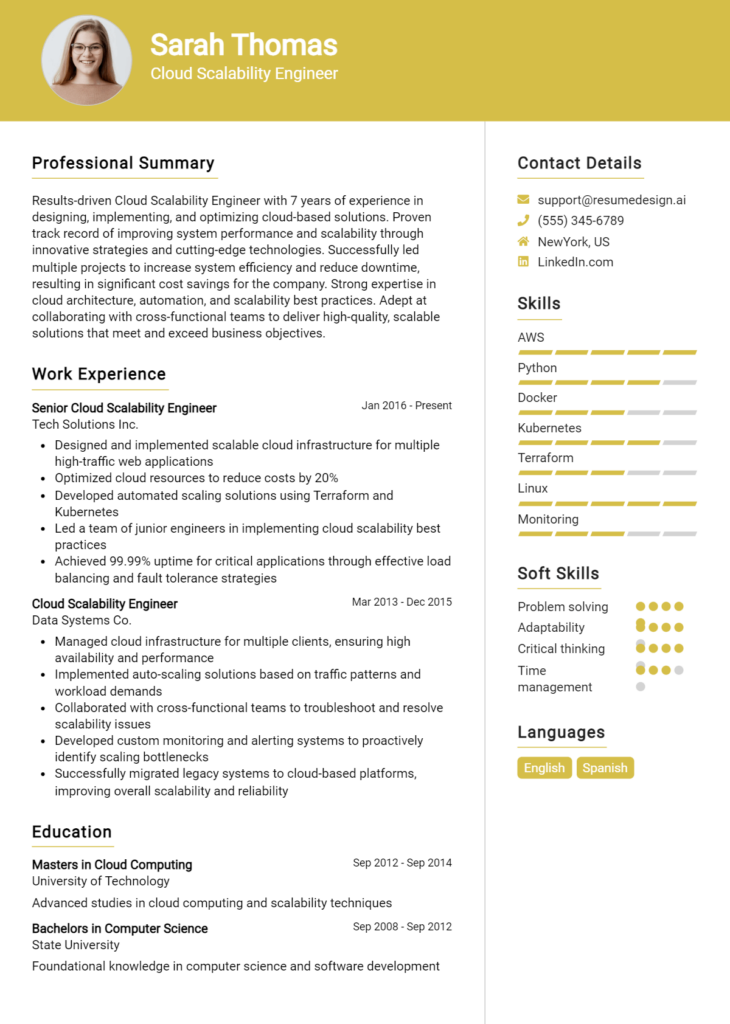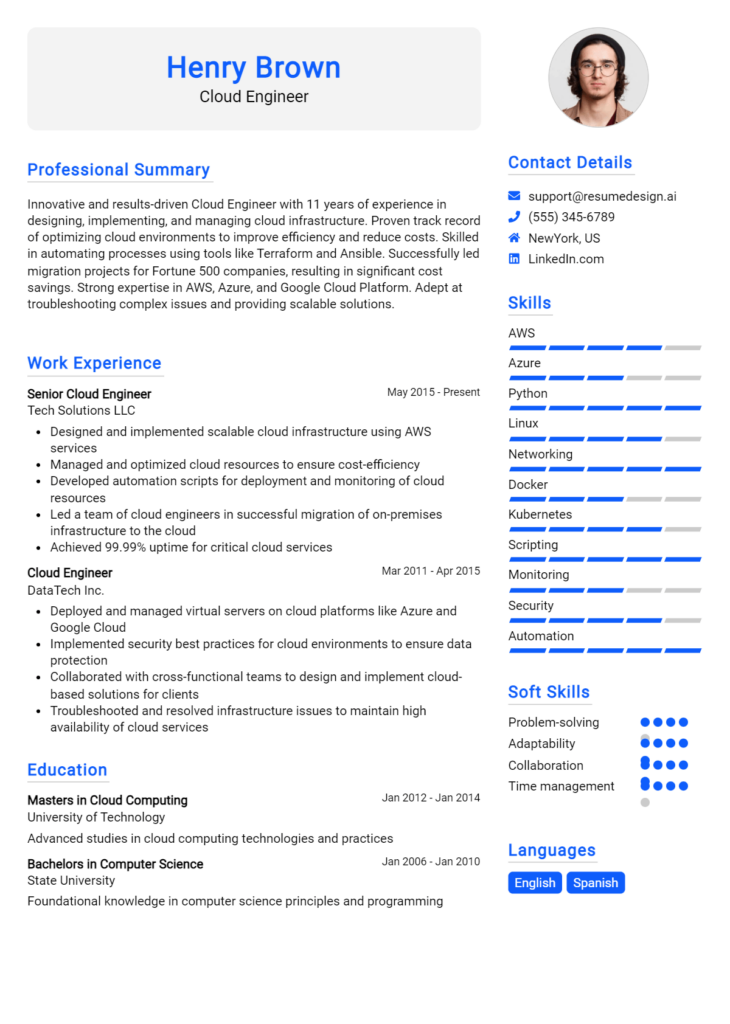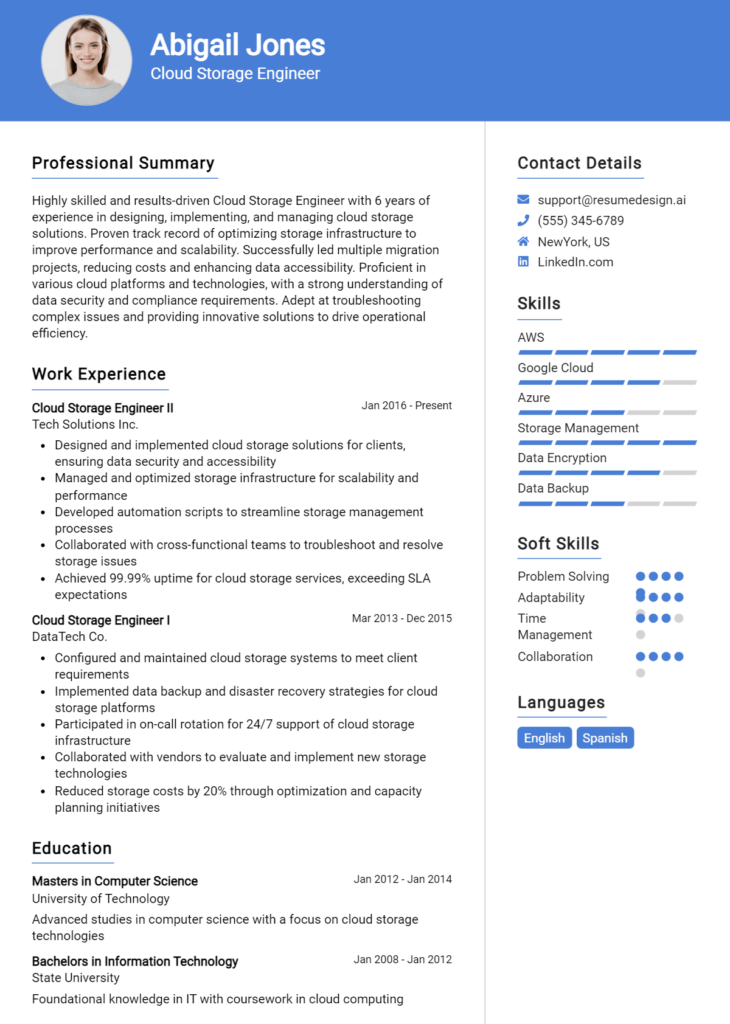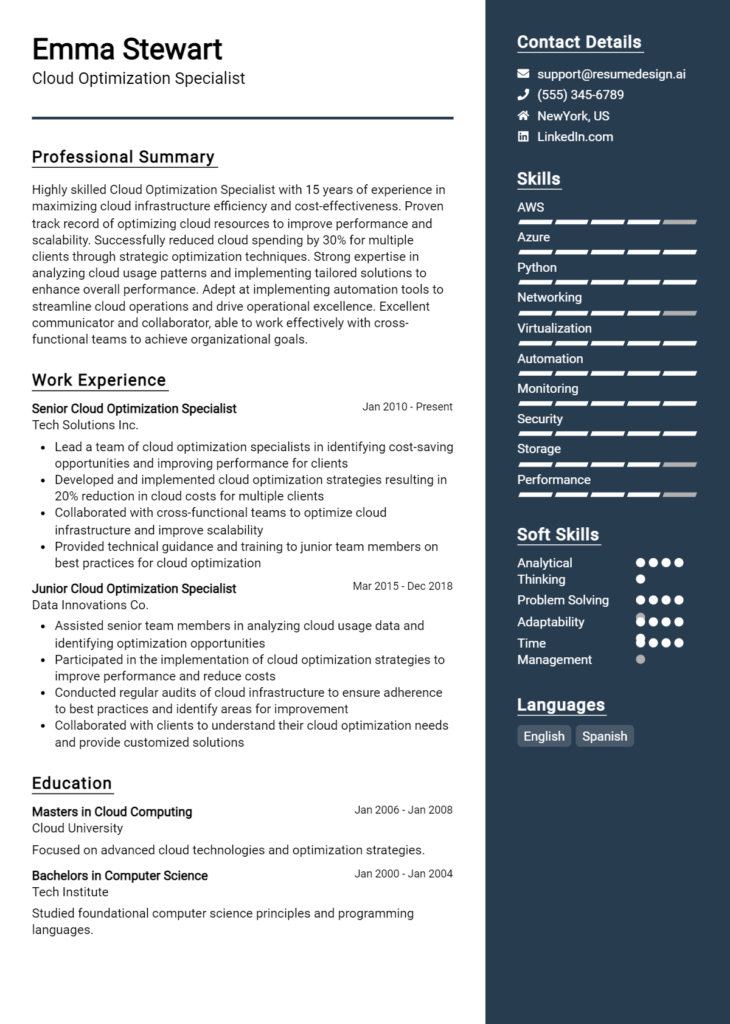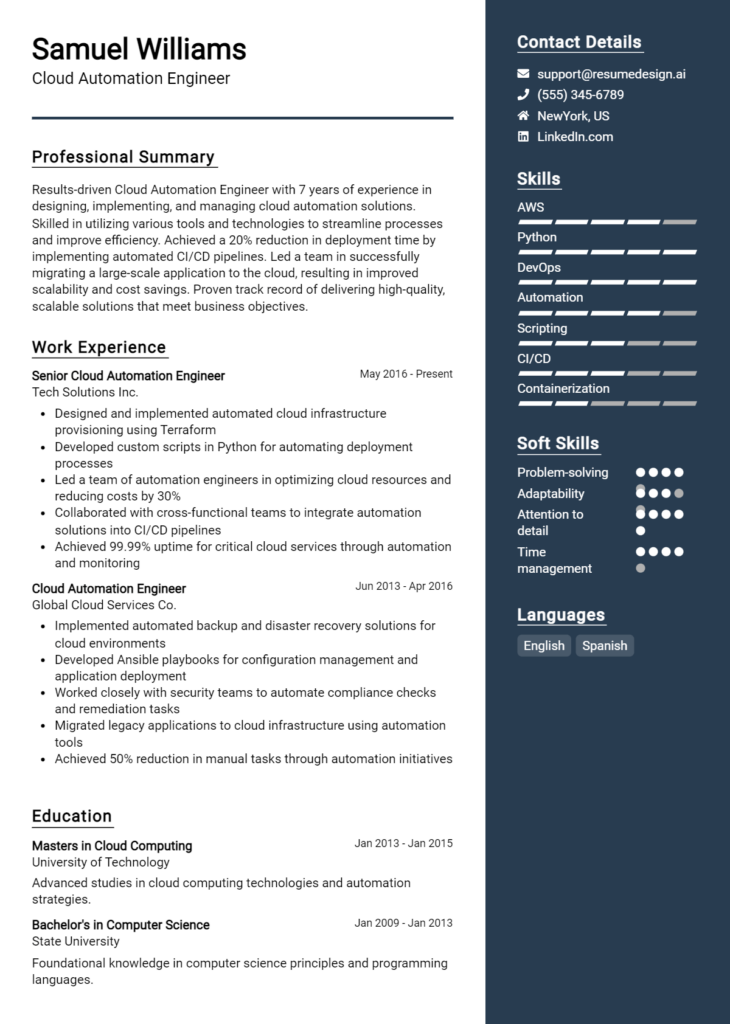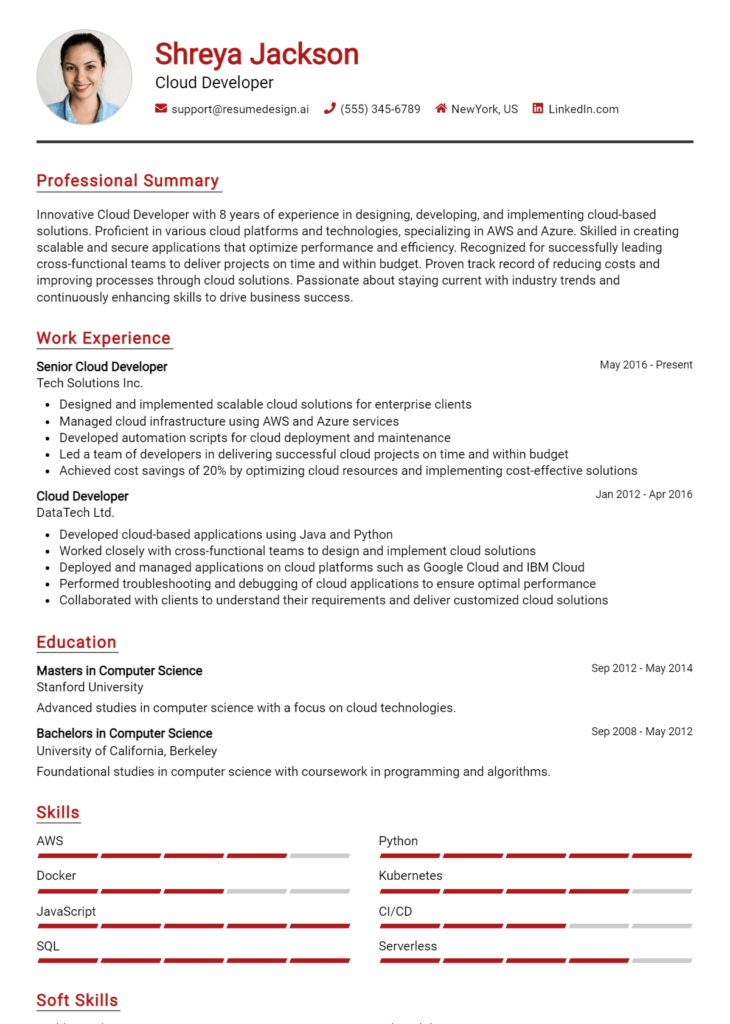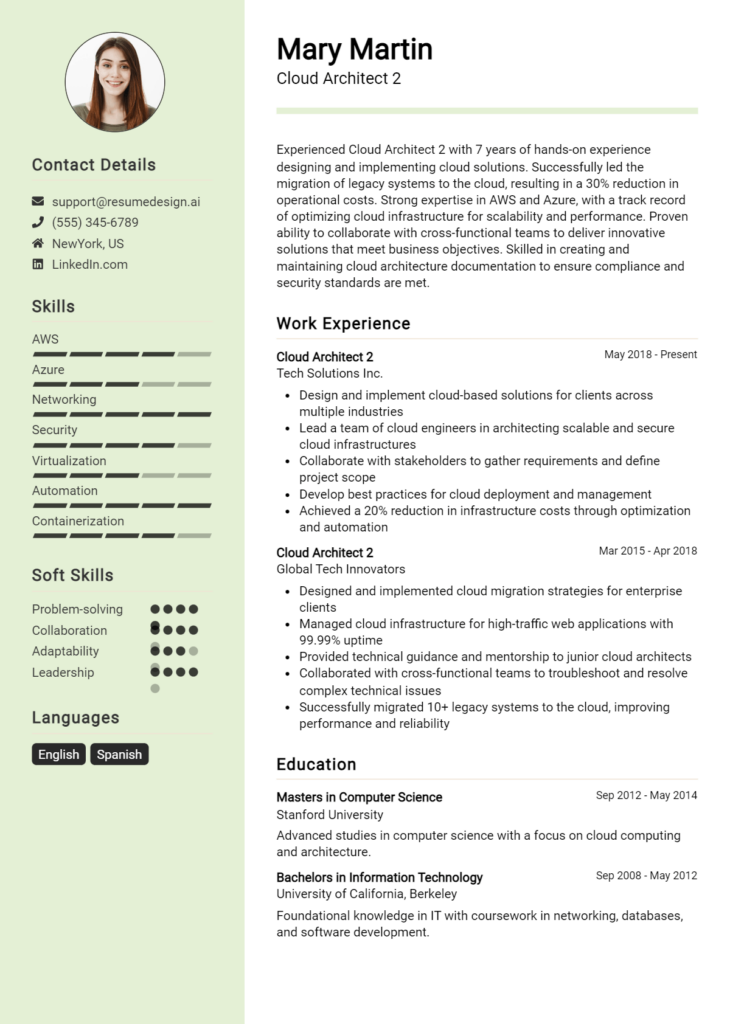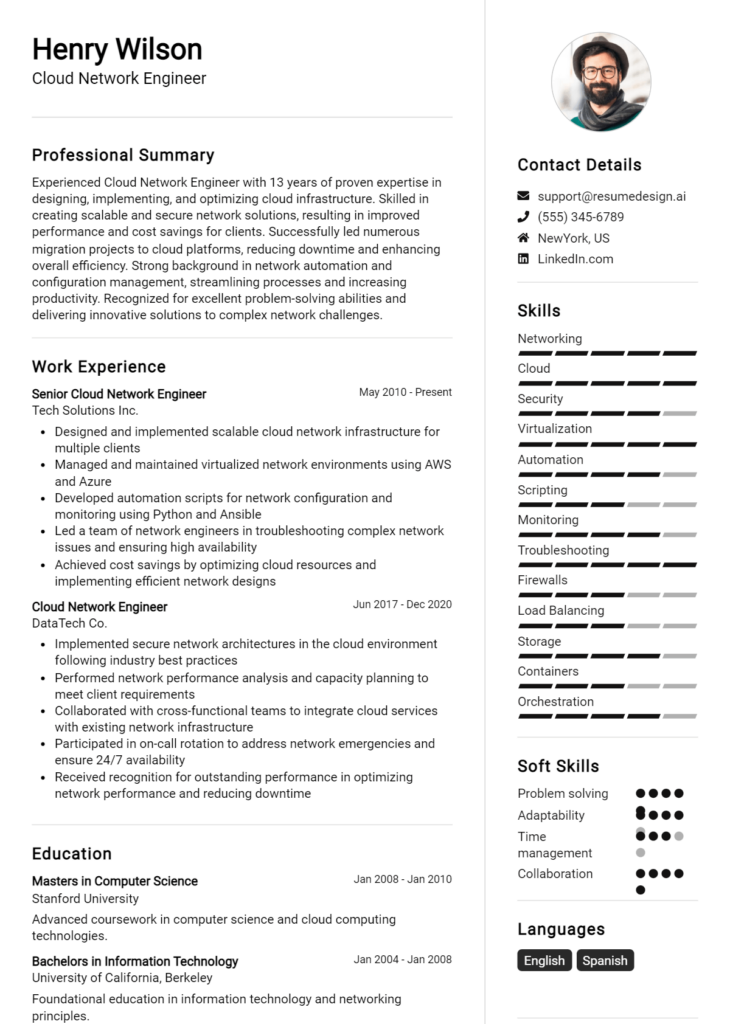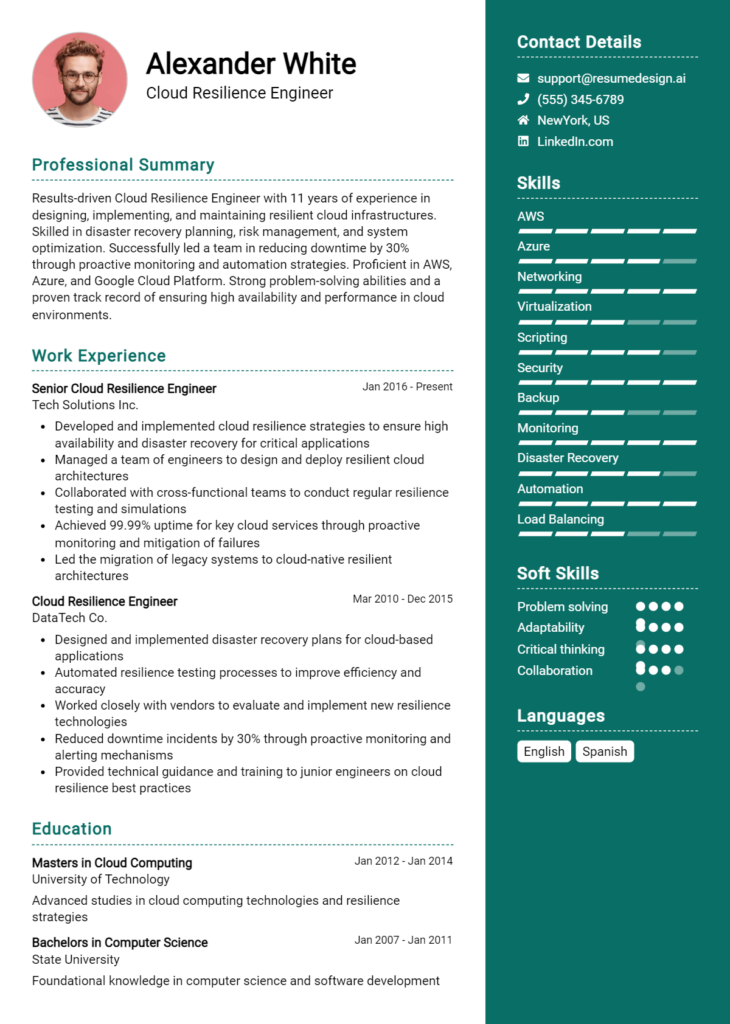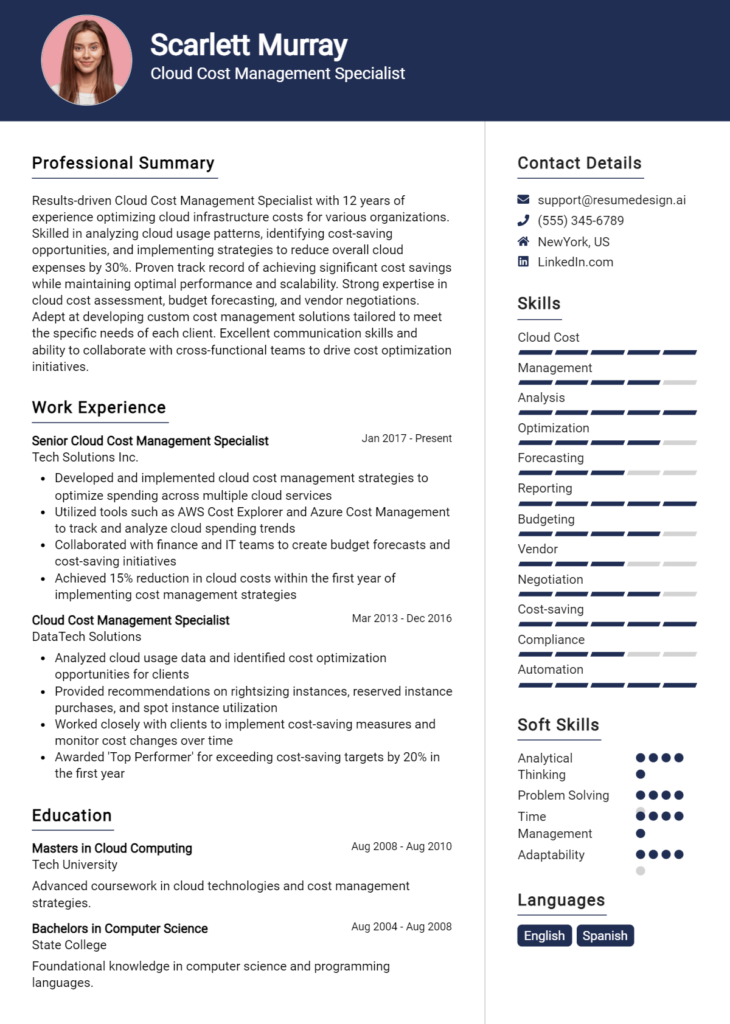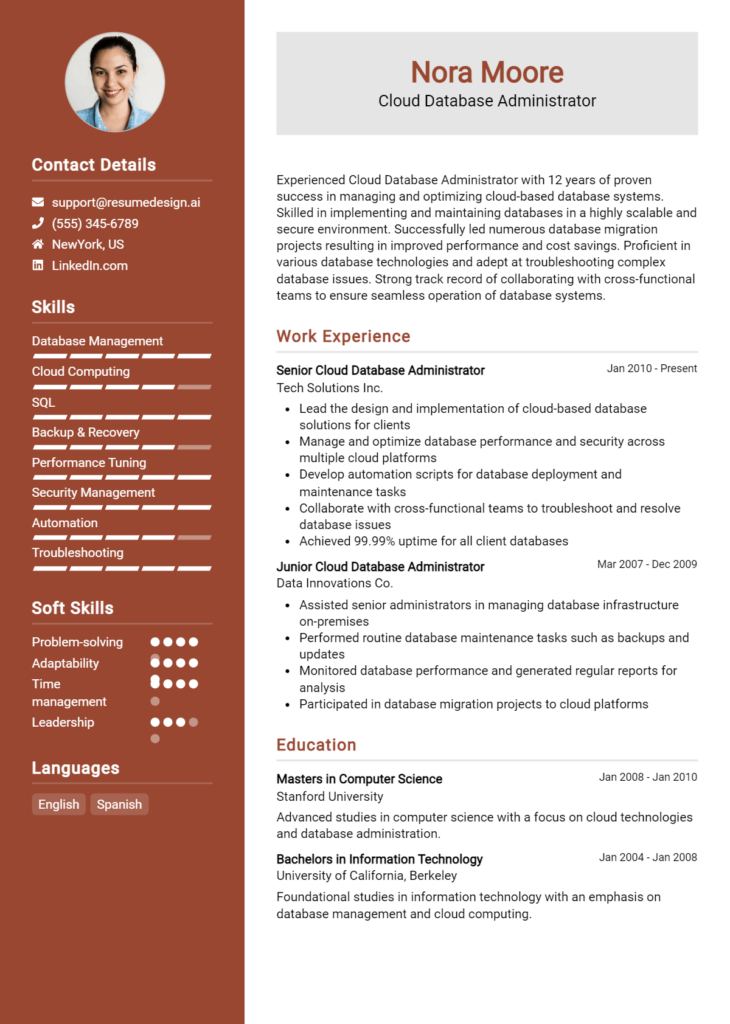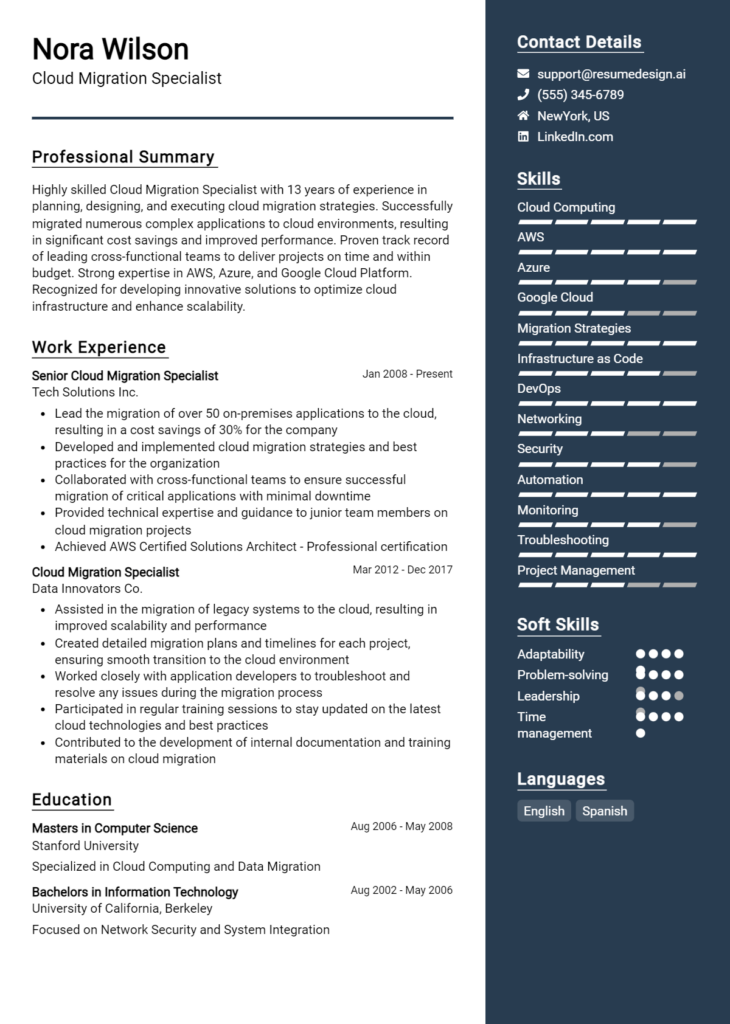Cloud DevOps Engineer Core Responsibilities
A Cloud DevOps Engineer plays a pivotal role in enhancing collaboration between development and operations teams, ensuring seamless deployment and integration of cloud services. Key responsibilities include automating processes, managing infrastructure, and monitoring system performance. Essential skills encompass technical expertise in cloud platforms, operational acumen, and strong problem-solving abilities. These competencies are crucial for driving organizational goals, and a well-structured resume can effectively highlight these qualifications to potential employers.
Common Responsibilities Listed on Cloud DevOps Engineer Resume
- Design and implement cloud infrastructure and services.
- Automate deployment processes using CI/CD pipelines.
- Monitor and maintain system performance and reliability.
- Collaborate with development teams to streamline operations.
- Manage cloud security and compliance measures.
- Troubleshoot and resolve infrastructure-related issues.
- Implement configuration management tools.
- Document processes and system configurations.
- Conduct performance tuning and optimization.
- Engage in capacity planning and resource management.
- Participate in on-call support and incident management.
- Stay updated with emerging cloud technologies and best practices.
High-Level Resume Tips for Cloud DevOps Engineer Professionals
In today's competitive job market, a well-crafted resume is crucial for Cloud DevOps Engineer professionals looking to make a strong impression on potential employers. Your resume is often the first point of contact with hiring managers, and it serves as a powerful marketing tool to showcase your skills, experiences, and accomplishments. A compelling resume not only highlights your technical expertise but also demonstrates how you can add value to an organization. In this guide, we will provide practical and actionable resume tips specifically tailored for Cloud DevOps Engineer professionals, ensuring that your resume stands out in a sea of applicants.
Top Resume Tips for Cloud DevOps Engineer Professionals
- Tailor your resume to each job description by incorporating relevant keywords and phrases that match the specific requirements of the position.
- Highlight your experience with cloud platforms such as AWS, Azure, or Google Cloud, emphasizing specific projects you've completed.
- Quantify your achievements by including metrics, such as the percentage of deployment time reduced or the number of successful releases managed.
- Showcase your knowledge of CI/CD tools and practices, detailing how you have implemented these processes in previous roles.
- Include certifications relevant to Cloud DevOps, such as AWS Certified DevOps Engineer or Certified Kubernetes Administrator, to demonstrate your expertise.
- Highlight your experience with automation tools and scripts, explaining how you improved efficiency or reduced manual work.
- Demonstrate your collaborative skills by mentioning cross-functional teams you’ve worked with and the outcomes of those collaborations.
- Keep your resume concise and focused, ideally one page, while ensuring it covers all critical aspects of your professional journey.
- Utilize a clean, professional layout that enhances readability and draws attention to key sections of your resume.
By implementing these tips, you can significantly increase your chances of landing a job in the Cloud DevOps Engineer field. A well-structured resume that effectively communicates your qualifications and achievements will not only captivate employers but also position you as a strong candidate ready to tackle the challenges of modern cloud environments.
Why Resume Headlines & Titles are Important for Cloud DevOps Engineer
In the competitive field of Cloud DevOps engineering, a well-crafted resume headline or title is essential for standing out among numerous applicants. A strong headline can effectively capture the attention of hiring managers by summarizing a candidate's key qualifications in a single impactful phrase. It serves as the first impression and can set the tone for the entire resume, making it crucial that it is concise, relevant, and directly related to the specific job being applied for. A compelling resume title not only highlights the applicant's expertise but also aligns with the expectations of potential employers, ultimately increasing the chances of securing an interview.
Best Practices for Crafting Resume Headlines for Cloud DevOps Engineer
- Keep it concise and to the point, ideally under 10 words.
- Include specific role-related keywords to enhance relevance.
- Highlight your most significant achievements or skills.
- Tailor the headline for each job application to match the job description.
- Use action-oriented language to convey confidence and proactivity.
- Avoid jargon unless it is widely recognized in the industry.
- Consider including years of experience to showcase your expertise.
- Make sure it reflects your personal brand and professional identity.
Example Resume Headlines for Cloud DevOps Engineer
Strong Resume Headlines
“Certified Cloud DevOps Engineer with 5+ Years of Experience in AWS and CI/CD”
“Results-Driven DevOps Engineer Specializing in Containerization and Automation”
“Innovative Cloud Solutions Architect Focused on Performance Optimization and Cost Reduction”
Weak Resume Headlines
“DevOps Engineer”
“Experienced Professional Seeking Opportunities”
The strong headlines are effective because they are specific, showcasing relevant skills and experiences that align with the Cloud DevOps role. They convey a sense of expertise by incorporating industry keywords and measurable achievements, making them more appealing to hiring managers. In contrast, the weak headlines fail to impress due to their vagueness and lack of detail, which does not give potential employers any compelling reason to consider the candidate further. A strong headline is critical in creating an impactful first impression, while weak headlines can lead to missed opportunities.
Writing an Exceptional Cloud DevOps Engineer Resume Summary
A well-crafted resume summary is essential for a Cloud DevOps Engineer as it serves as the first impression hiring managers will have of a candidate. This brief yet powerful section of the resume highlights key skills, relevant experience, and notable accomplishments that align with the demands of the role. An impactful summary quickly captures the attention of employers, allowing them to gauge the candidate's fit for the position, making it crucial to keep the summary concise, focused, and tailored to the specific job application.
Best Practices for Writing a Cloud DevOps Engineer Resume Summary
- Quantify achievements where possible, using metrics to demonstrate impact.
- Highlight relevant skills, including tools and technologies specific to Cloud and DevOps.
- Tailor the summary to match the job description, using keywords from the posting.
- Keep it concise, ideally within 3-5 sentences, to maintain readability.
- Use action verbs to convey dynamism and proactivity.
- Showcase unique accomplishments that differentiate you from other candidates.
- Focus on both technical and soft skills that are essential for collaboration and problem-solving.
- Avoid jargon and vague language; clarity is key.
Example Cloud DevOps Engineer Resume Summaries
Strong Resume Summaries
Results-driven Cloud DevOps Engineer with over 5 years of experience optimizing cloud infrastructure for improved performance. Successfully reduced deployment times by 30% through automation and continuous integration practices, leveraging tools such as Jenkins and Docker.
Detail-oriented DevOps professional skilled in AWS and Kubernetes, with a proven track record of enhancing system reliability and uptime by 40%. Adept at implementing CI/CD pipelines that streamline development processes and improve team collaboration.
Innovative Cloud DevOps Engineer with expertise in Terraform and Ansible, achieving a 50% reduction in manual deployment errors. Proven ability to manage complex cloud environments and drive cost-effective solutions while maintaining high security and compliance standards.
Weak Resume Summaries
Experienced engineer with a background in cloud technologies looking for a new opportunity in DevOps.
Cloud DevOps Engineer with various skills seeking to contribute to a team and grow in the field.
The strong examples are effective because they provide specific achievements, metrics, and relevant skills that directly relate to the Cloud DevOps Engineer role, making the candidates stand out. In contrast, the weak summaries lack detail and specificity, making them appear generic and less compelling to hiring managers.
Work Experience Section for Cloud DevOps Engineer Resume
The work experience section of a Cloud DevOps Engineer resume is a critical element that allows candidates to demonstrate their technical prowess, leadership capabilities, and commitment to delivering high-quality products. This section not only highlights specific technical skills and tools used throughout their careers but also showcases their ability to manage teams effectively and collaborate across departments. By quantifying achievements and aligning their experiences with industry standards, candidates can present themselves as valuable assets to potential employers, underscoring their impact in previous roles and readiness for future challenges.
Best Practices for Cloud DevOps Engineer Work Experience
- Focus on quantifiable results, such as percentage improvements in deployment times or cost savings achieved.
- Use specific technical terminology relevant to DevOps tools and practices, such as CI/CD, containerization, and cloud platforms.
- Highlight instances of leadership and collaboration, detailing how you managed teams or projects.
- Align your experiences with industry standards and best practices to demonstrate your understanding of the field.
- Showcase your problem-solving skills by describing challenges faced and how you overcame them.
- Include relevant certifications or training that enhance your qualifications within the work experience context.
- Use action verbs to convey a sense of initiative and impact in your roles.
- Tailor your experiences to match the requirements listed in the job description to make your resume more compelling.
Example Work Experiences for Cloud DevOps Engineer
Strong Experiences
- Led a cross-functional team to implement a CI/CD pipeline, reducing deployment times by 40% and improving software release frequency by 30%.
- Developed and managed cloud infrastructure on AWS, achieving a 25% reduction in costs through efficient resource allocation and automation.
- Collaborated with development and operations teams to streamline incident response processes, resulting in a 50% decrease in system downtime.
- Implemented container orchestration using Kubernetes, increasing application scalability and resilience by 60%.
Weak Experiences
- Worked on cloud projects.
- Participated in team meetings to discuss DevOps practices.
- Helped with a few deployments.
- Assisted in some coding tasks.
The examples provided illustrate the difference between strong and weak experiences in a Cloud DevOps Engineer resume. Strong experiences are characterized by specific achievements and quantifiable outcomes that reflect the candidate's technical leadership and collaborative efforts, demonstrating a clear impact on business objectives. In contrast, weak experiences lack detail and measurable results, providing little insight into the candidate's skills or contributions, thus failing to engage potential employers.
Education and Certifications Section for Cloud DevOps Engineer Resume
The education and certifications section of a Cloud DevOps Engineer resume is crucial for showcasing a candidate's academic background and their commitment to continuous learning in a rapidly evolving field. This section not only highlights relevant degrees and industry-recognized certifications but also emphasizes specialized training and coursework that align with the demands of the role. By providing this information, candidates can significantly enhance their credibility and demonstrate their readiness to tackle the challenges associated with Cloud DevOps practices, ultimately making a compelling case for their fit within the organization.
Best Practices for Cloud DevOps Engineer Education and Certifications
- Include only relevant degrees and certifications pertinent to the Cloud DevOps field.
- Use clear and concise formatting to ensure easy readability.
- Highlight advanced certifications from recognized organizations such as AWS, Azure, or Google Cloud.
- Incorporate relevant coursework that showcases practical skills and knowledge.
- List any specialized training or boot camps that enhance your technical expertise.
- Keep the section up-to-date to reflect your most current qualifications.
- Consider including any ongoing education efforts, such as online courses or workshops.
- Tailor the content to align with the specific requirements of the job description.
Example Education and Certifications for Cloud DevOps Engineer
Strong Examples
- Bachelor of Science in Computer Science, XYZ University
- AWS Certified DevOps Engineer – Professional
- Google Cloud Professional Cloud DevOps Engineer Certification
- Coursework in Cloud Computing, Continuous Integration/Continuous Deployment (CI/CD), and Infrastructure as Code (IaC)
Weak Examples
- Associate's Degree in Fine Arts
- Certification in Basic Computer Skills
- Outdated Microsoft Certified Systems Engineer (MCSE) certification from 2010
- High School Diploma with no relevant coursework
The strong examples are considered effective because they are directly relevant to the Cloud DevOps Engineer role, demonstrating both the candidate's educational background and specialized certifications that are highly regarded in the industry. In contrast, the weak examples fail to demonstrate relevance to the position, either by lacking technical focus or by presenting outdated qualifications that do not align with current industry standards, thereby diminishing the candidate's credibility.
Top Skills & Keywords for Cloud DevOps Engineer Resume
The role of a Cloud DevOps Engineer is pivotal in modern IT environments, where agility and efficiency are paramount. With the rapid evolution of cloud technologies and the increasing demand for streamlined development and operations processes, showcasing the right skills on your resume is essential. Highlighting both technical and interpersonal abilities not only demonstrates your competency in managing cloud infrastructure and automation but also your capacity to collaborate effectively within teams. By emphasizing these skills, you can create a compelling narrative that resonates with potential employers, showcasing your readiness to tackle the challenges of this dynamic field.
Top Hard & Soft Skills for Cloud DevOps Engineer
Soft Skills
- Excellent communication skills
- Strong problem-solving abilities
- Team collaboration and interpersonal skills
- Adaptability to changing environments
- Time management and prioritization
- Critical thinking and analytical skills
- Attention to detail
- Leadership and mentorship capabilities
- Conflict resolution skills
- Continuous learning and self-improvement mindset
Hard Skills
- Proficiency in cloud platforms (AWS, Azure, Google Cloud)
- Containerization technologies (Docker, Kubernetes)
- Infrastructure as Code (IaC) tools (Terraform, CloudFormation)
- Continuous Integration/Continuous Deployment (CI/CD) pipelines
- Scripting languages (Python, Bash, PowerShell)
- Configuration management tools (Ansible, Puppet, Chef)
- Monitoring and logging tools (Prometheus, Grafana, ELK stack)
- Networking fundamentals and security best practices
- Version control systems (Git, GitHub, GitLab)
- Database management and administration (SQL, NoSQL)
To further enhance your resume, consider exploring how to effectively present your skills and work experience to align with the expectations of hiring managers in the cloud DevOps space.
Stand Out with a Winning Cloud DevOps Engineer Cover Letter
Dear Hiring Manager,
I am writing to express my interest in the Cloud DevOps Engineer position at [Company Name], as advertised on [Where You Found the Job Posting]. With a robust background in cloud computing, continuous integration, and automation, I am excited about the opportunity to contribute to your team and help drive innovative solutions. My experience in deploying applications on platforms such as AWS and Azure, coupled with my expertise in CI/CD pipelines, positions me well to support the dynamic needs of your organization.
In my previous role at [Previous Company Name], I successfully led a team responsible for migrating legacy applications to a cloud-native architecture, resulting in a 30% improvement in deployment speed and a significant reduction in operational costs. I implemented infrastructure as code using tools like Terraform and Ansible, ensuring that our environments were consistently reproducible and scalable. My commitment to best practices in DevOps has not only enhanced our development processes but has also fostered a culture of collaboration and efficiency among cross-functional teams.
I am particularly drawn to the innovative projects at [Company Name] and admire your commitment to leveraging cloud technologies for enhanced business outcomes. I am eager to bring my skills in automation, monitoring, and security to your team, ensuring that your cloud infrastructure is robust and reliable. I am confident that my proactive approach and problem-solving abilities will allow me to make a meaningful impact as part of your esteemed organization.
Thank you for considering my application. I look forward to the opportunity to discuss how my background, skills, and enthusiasms align with the goals of [Company Name]. I am excited about the possibility of contributing to your team and helping to drive cloud initiatives that deliver exceptional results.
Sincerely,
[Your Name]
[Your Contact Information]
Common Mistakes to Avoid in a Cloud DevOps Engineer Resume
When crafting a resume for a Cloud DevOps Engineer position, many applicants make critical mistakes that can hinder their chances of capturing the attention of hiring managers. A well-structured resume not only showcases technical skills and relevant experiences but also reflects an understanding of the role's specific requirements. Avoiding common pitfalls can significantly enhance your chances of landing an interview. Below are some of the most frequent mistakes to steer clear of when creating a resume for a Cloud DevOps Engineer role:
Vague Job Descriptions: Failing to provide specific details about previous roles and responsibilities can leave hiring managers uncertain about your experience. Use quantifiable achievements to illustrate your impact.
Ignoring Keywords: Many companies use automated systems to screen resumes. Neglecting to include relevant keywords from the job description can result in your resume being overlooked. Tailor your resume to match the job listing.
Lack of Relevant Skills: Focusing on outdated or irrelevant skills can detract from your qualifications. Highlight skills specifically related to cloud technologies, CI/CD pipelines, and containerization tools.
Overloading with Technical Jargon: While it’s important to demonstrate technical proficiency, using excessive jargon can confuse readers. Aim for clarity and balance technical terms with easily understandable language.
Not Showcasing Collaboration Skills: DevOps emphasizes collaboration between development and operations teams. Failing to mention teamwork experiences or communication skills can undermine your fit for the role.
Neglecting Soft Skills: Technical expertise is crucial, but soft skills such as problem-solving, adaptability, and critical thinking are equally important. Ensure your resume reflects these attributes.
Using a Generic Template: A one-size-fits-all resume can appear unprofessional and unengaging. Customize your resume design and content to reflect your personal brand and the specific job you’re applying for.
Ignoring Formatting Consistency: Inconsistent formatting can distract from your qualifications and make your resume difficult to read. Use uniform font sizes, bullet points, and spacing throughout your document to create a polished look.
Conclusion
In summary, a Cloud DevOps Engineer plays a vital role in bridging the gap between development and operations, ensuring seamless deployment and management of applications in cloud environments. Key skills include proficiency in cloud services (AWS, Azure, Google Cloud), scripting and automation capabilities, and a solid understanding of CI/CD pipelines. Additionally, familiarity with containerization technologies like Docker and orchestration tools like Kubernetes is essential for optimizing workflows and enhancing scalability.
As the demand for skilled Cloud DevOps Engineers continues to grow, it's crucial to present a strong resume that highlights your technical expertise and relevant experience. Take the time to review and refine your resume to stand out in a competitive job market.
To assist you in this process, explore the various resources available to enhance your application materials: utilize resume templates to create a professional layout, leverage the resume builder for easy customization, review resume examples for inspiration, and consider using cover letter templates to complement your resume. Start refining your documents today and take a confident step toward your next career opportunity!

